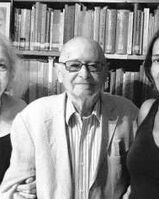Tola, F.: Difference between revisions
No edit summary |
No edit summary |
||
| Line 5: | Line 5: | ||
|bio=Carmen Dragonetti (born in Argentina, 1937) and Fernando Tola (born in Peru, 1915) are the most prestigious Indologists in the Spanish-speaking world, both being researchers from the National Council for Scientific and Technical Research, Argentina. They were President and Vice-President, respectively, of the Institute of Buddhist Studies Foundation (FIEB). | |bio=Carmen Dragonetti (born in Argentina, 1937) and Fernando Tola (born in Peru, 1915) are the most prestigious Indologists in the Spanish-speaking world, both being researchers from the National Council for Scientific and Technical Research, Argentina. They were President and Vice-President, respectively, of the Institute of Buddhist Studies Foundation (FIEB). | ||
Both were professors at universities in Peru and Argentina. Dedicated to Indology and the study of Buddhism, they published a large number of books and articles in Spanish and English, containing highly reliable translations of Sanskrit, Pali, Chinese and/or Tibetan texts, such as the unsurpassed Tola versions of the Gita Govinda and the Bhagavad Gita, and Dragonetti's Dhammapada, which are remarkable for their beauty and clarity, one of the most relevant qualities of these authors as writers. | Both were professors at universities in Peru and Argentina. Dedicated to Indology and the study of Buddhism, they published a large number of books and articles in Spanish and English, containing highly reliable translations of Sanskrit, Pali, Chinese and/or Tibetan texts, such as the unsurpassed Tola versions of the ''Gita Govinda'' and the ''Bhagavad Gita'', and Dragonetti's ''Dhammapada'', which are remarkable for their beauty and clarity, one of the most relevant qualities of these authors as writers. | ||
Other translations by the same authors include Five Mahayana Sutras, also published by Primorda Media, the Udana and The Sutra of Infinite Meanings, Wu liang i ching. ([https://www-librosbudistas-com.translate.goog/autor/carmen-dragonetti-fernando-tola?_x_tr_sch=http&_x_tr_sl=es&_x_tr_tl=en&_x_tr_hl=en Adapted from Source Oct 4, 2022]) | Other translations by the same authors include ''Five Mahayana Sutras'', also published by Primorda Media, the ''Udana'' and ''The Sutra of Infinite Meanings'', ''Wu liang i ching''. ([https://www-librosbudistas-com.translate.goog/autor/carmen-dragonetti-fernando-tola?_x_tr_sch=http&_x_tr_sl=es&_x_tr_tl=en&_x_tr_hl=en Adapted from Source Oct 4, 2022]) | ||
|images=File:Fernando Tola.jpg | |images=File:Fernando Tola.jpg | ||
|yeardeath=2017 | |yeardeath=2017 | ||
|classification=People | |classification=People | ||
}} | }} | ||
Revision as of 18:32, 7 October 2022
| PersonType | Category:Translators |
|---|---|
| MainNamePhon | Fernando Tola |
| SortName | Tola, Fernando |
| bio | Carmen Dragonetti (born in Argentina, 1937) and Fernando Tola (born in Peru, 1915) are the most prestigious Indologists in the Spanish-speaking world, both being researchers from the National Council for Scientific and Technical Research, Argentina. They were President and Vice-President, respectively, of the Institute of Buddhist Studies Foundation (FIEB).
Both were professors at universities in Peru and Argentina. Dedicated to Indology and the study of Buddhism, they published a large number of books and articles in Spanish and English, containing highly reliable translations of Sanskrit, Pali, Chinese and/or Tibetan texts, such as the unsurpassed Tola versions of the Gita Govinda and the Bhagavad Gita, and Dragonetti's Dhammapada, which are remarkable for their beauty and clarity, one of the most relevant qualities of these authors as writers. Other translations by the same authors include Five Mahayana Sutras, also published by Primorda Media, the Udana and The Sutra of Infinite Meanings, Wu liang i ching. (Adapted from Source Oct 4, 2022) |
| YearDeath | 2017 |
| Other wikis |
If the page does not yet exist on the remote wiki, you can paste the tag |

